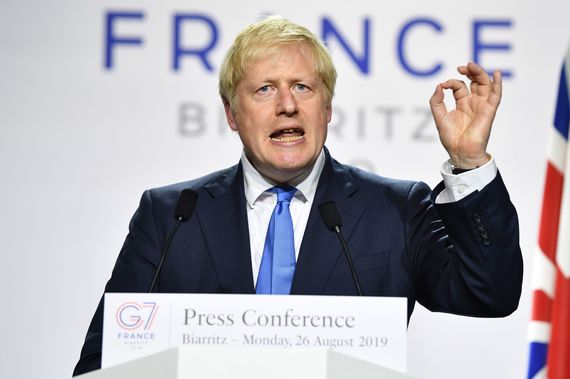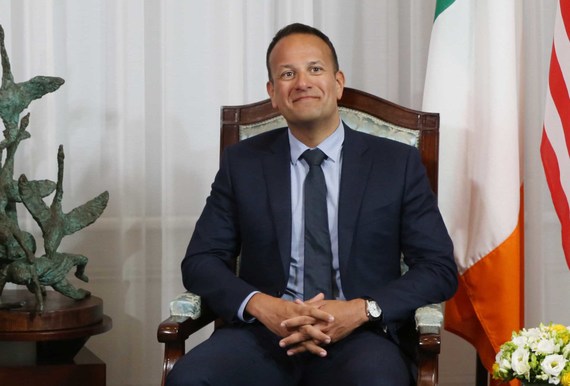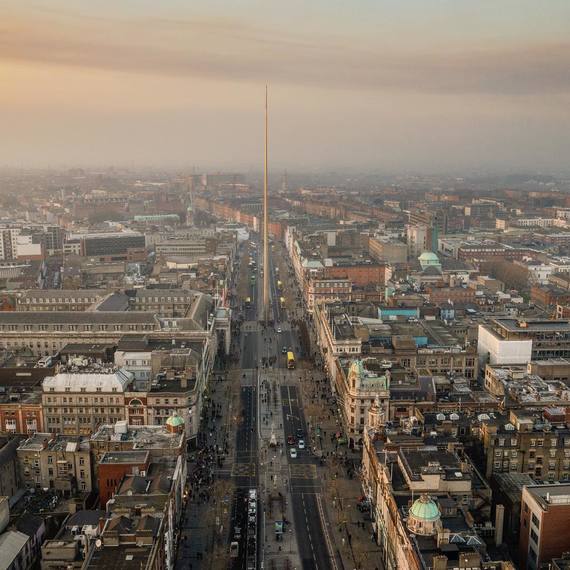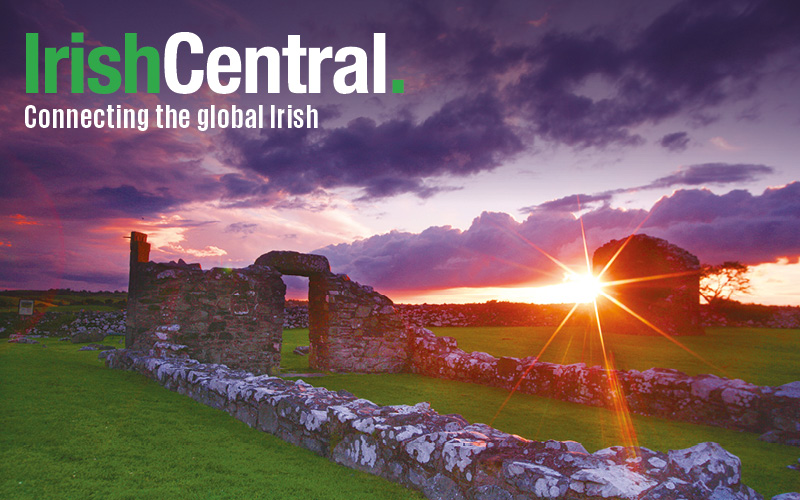As the idea of a united Ireland is gaining some acceptance and with a no-deal Brexit approaching rapidly it may be that opting for the unthinkable is the only solution
In recent weeks the idea that a united Ireland could happen soon has been gaining some acceptance here even in places you might not expect it. It's the kind of stuff that used to be confined to the ramblings of bar stool republicans.
Now you hear otherwise sensible commentators and academics discussing it in the media as a real possibility. Or even an inevitability.
The reason, of course, is Brexit. With a no-deal crash-out by the U.K. rapidly approaching, thanks to the Irish government's insistence that there can be no dilution of the backstop, huge economic damage lies ahead for Britain, Ireland, and most of all Northern Ireland.
The only way the damage in the North can be minimized is for them to stay in the EU, which the majority there voted to do anyway. And the only way they can do that is by joining the south in some form of united Ireland.
After a hard Brexit, the argument goes, moderate unionists will soon realize they are facing economic Armageddon and that they can't rely on Prime Minister Boris Johnson who will be fully occupied grappling with the fallout in the rest of the U.K. They will quickly come to the conclusion that their best interests lie in doing the unthinkable and opting to be part of a united Ireland within the EU. Our job in the south, we are told, is to prepare the ground to make this momentous decision as easy as possible for them.

British Prime Minister Boris Johnson.
It sounds plausible to some degree since the unionists have a reputation for being a canny crew who know which side their bread is buttered on. But the argument is superficial because it assumes that economics will be the deciding factor rather than the deep-seated political and cultural roots which tie the unionists to Britain.
Keep up-to-date with IrishCentral's Brexit news here
The clue is in their name. They are far more likely to tighten their belts and make the best of a bad situation than abandon the Queen for the Republic.
Of course, a lot would depend on how bad it gets. It is possible that if it gets really bad just enough unionists would be pushed into backing unity out of desperation.
And given the demographic changes in the North it would not take that many of them, added to the Nationalists, to produce a majority for a united Ireland right now. Under the Good Friday Agreement, a border poll must be held if the secretary of state for Northern Ireland believes that such a majority is likely.
On that basis, it may seem reasonable to predict that a united Ireland is on the way. But it's much more complicated than that.
Apart from the attitude of moderate unionists, there is another assumption in this argument which is also far from certain -- that all nationalists in the North would automatically vote to join the south. When it comes down to it in the privacy of the voting booths, how many might decide that the U.K. welfare benefits, National Health Service, education and other public services in the North would not be matched in the Republic?
Read more: How to pass Brexit - the Northern Ireland problem
Yes, welfare payments here are high, but there is a lot of uncertainty about our ability to maintain them into the future if a hard Brexit does the predicted heavy damage to the economy here. Plus public services in health, education, social housing and so on are regarded as far better in the North. So it is possible that many people from the nationalist community in the North might think twice about voting for unity.
That is only the start of the many uncertainties that are bound up in this highly complicated issue. As Taoiseach Leo Varadkar pointed out a couple of weeks ago during a visit to West Belfast, there would be many challenges involved in forming a united Ireland.

Taoiseach Leo Varadkar.
Some of these are obvious and simple. For example, we would need a new national anthem to represent all traditions on the island—the wording of our present anthem is a call to arms in the fight for freedom.
And we would need a new flag. Even though our green, white and orange Tricolor is supposed to symbolize peace between nationalists and unionists, it is seen by unionists as representing the Republic only. Then there is the position of Irish in our Constitution as the first official language—that would have to go as well.
In fact, as Varadkar pointed out, we would need a completely new Constitution which would reflect the beliefs, values, and aspirations of everyone on the island rather than the present narrowly framed one. Before that would be possible we would have to agree on whether we were going to have a tight unitary state with the parliament in Dublin or a looser federal arrangement perhaps with Stormont continuing as a regional parliament in the North.
All of this is important because it would pose real problems for people in the Republic—you will remember that a vote for unity has to be passed both in the south and the North before it can happen. That is often forgotten in discussions about a future united Ireland and it would be foolish to assume that a vote for unity would sail through automatically in the south.
Even more concerning than the anthem, the flag and the Constitution for people in the south, of course, would be the enormous cost involved in unity. As you know, the North now gets an annual subvention from the U.K. of around £10 billion. There are 65 million people in the U.K. to carry this burden, but only five million people here to do so. If we had to take this on it would mean significant increases in taxation.
As polls here over the years have shown, the majority of Irish people support a united Ireland. But when additional questions are asked about paying more income tax, sales tax, etc. to make it possible, that support quickly falls away. It's far from clear how much, if any, extra taxation people here would be willing to pay for unity.
Read more: Irish politician compares Boris Johnson to Oliver Cromwell as Brexit nears
Even in normal times, the ability of the Republic to absorb the cost of the North would be doubtful. But with Brexit—hard or soft—about to have a major impact on our economy, these are far from normal times.
Maintaining living standards and services here will be the priority, not funding the North. All of which means that a vote for a united Ireland cannot be assumed in the south.

Dublin city: Brexit - hard or soft will have economic consequences.
The economic challenge that reunification would pose for the south is accepted by the majority of economists here. Even if one assumes that the U.K. would pick up a declining portion of the tab for a few years and that the EU and the U.S. would also provide some support, the cost to Irish taxpayers would still be significant.
To get around this unpalatable reality, proponents of a united Ireland have been pushing the benefits of unity with highly optimistic predictions on the future economic growth it could bring. (One much-quoted study along these lines was funded by a body associated with Sinn Féin.)
The fact is, however, that peace does not necessarily bring prosperity. The performance of the economy in the North has been even worse in recent years.
The reunification of Germany is sometimes offered as an example of the prosperity that could be attained here. But there are such differences that the comparison makes little sense, the most obvious being the ability of West Germany to absorb the costs involved. And the people of East Germany desperately wanted reunification, which is very different from the situation in Northern Ireland.
That leads us to one of the biggest concerns people in the south would have about a united Ireland—security. Even if one assumes that the majority of unionists -- the moderate middle ground—opted for unity, it is certain that a large minority would be bitterly opposed.
The fear is that we could see the kind of campaign run by the Provos in Belfast during The Troubles replicated in Dublin by loyalist gunmen. We could see shootings and bombings here in a campaign that might continue for years. Would people in the south be willing to risk that for the sake of a united Ireland?

British soldiers on patrol during The Troubles.
Even without painting such an alarming picture, talking to people in the south quickly reveals that they feel a considerable gulf between themselves and people in the North. There was horror here at the towering loyalist bonfires for the Twelfth of July this year, for example, and disgust at the posters that appeared in the Creggan in Derry after the murder of Lyra McKee. From the southern perspective, sectarian attitudes up North seem as deeply engrained and mindless as ever, with the latent threat of violence always there.
There is also impatience in the south—to put it mildly—at the economic stagnation in the North with so much of the population there on the state payroll in one form or another or on welfare. The perception here is that there is far too much complaining up there about the system and far too little initiative and hard work.
And then there's the wide gap between social attitudes in the south and the North on gay rights, abortion and so on, which can make the island look like two very different countries.
Put all of this together and it means that a vote in the south for unity would be far from certain to succeed. It would not be like an instant opinion poll, a quick yes or no on whether you support a united Ireland.
The vote would be preceded by many weeks of debate in which all of the issues and fears raised above would be discussed and assessed. And at the end, the people would decide whether a united Ireland is just a harmless daydream or a dangerous nightmare.




Comments